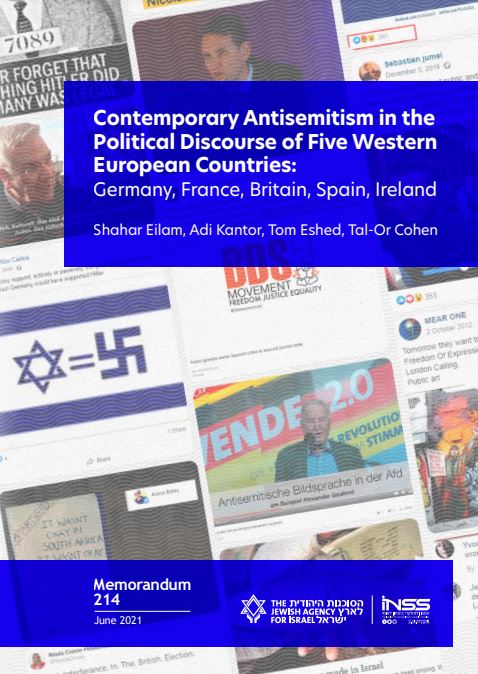Publications
Memorandum No. 214, June 15, 2021

This report, produced by the Institute for National Security Studies (INSS), in collaboration with the Jewish Agency for Israel, examines and analyzes the phenomenon of contemporary antisemitism in the political discourse of five major Western European countries—Germany, France, Britain, Spain, and Ireland. The research is based on systematic mapping of public expressions of antisemitism by elected officials, over a period of one year, from late 2019 until late 2020.
The findings indicate that some politicians in Western Europe—on both the right and the left—deliberately and maliciously use antisemitic ideas and expressions for political gains. This can be seen in the context of the increasing strength of extremist and populist parties on both sides of the political spectrum, which have contaminated the political and public discourse with antisemitic statements and attitudes.
Indeed, the present analysis indicates that the scale is tipping toward those who espouse antisemitism and away from those who try to moderate it, particularly given the process of sociopolitical radicalization, growing polarization, and the rise of once marginalized extremists at the expense of the moderate center. These processes have been accelerated by social media, which has been exploited to spread hateful content almost without any significant limits, at least for the time being.
All this has contributed to antisemitism’s increasingly becoming part of the political mainstream; the politicization of antisemitism as a means for political rivals to attack one another; and the appearance of cracks in the broad consensus both to preserve the memory of the Holocaust and fight against antisemitism. These cracks are manifested primarily by distorting and rewriting history mainly on the right and by anti-Israel discourse on the left.
Although it has unique characteristics, antisemitism must not be perceived as a local and domestic challenge for Jewish communities alone but rather as manifesting a much wider phenomenon of hate speech, hateful discourse, and sometimes even violence. The increasing politicization of antisemitism demonstrates the magnitude and influence that its destructive consequences have for the entire society, Jews and non-Jews alike, and therefore it needs to be recognized as a global concern.



